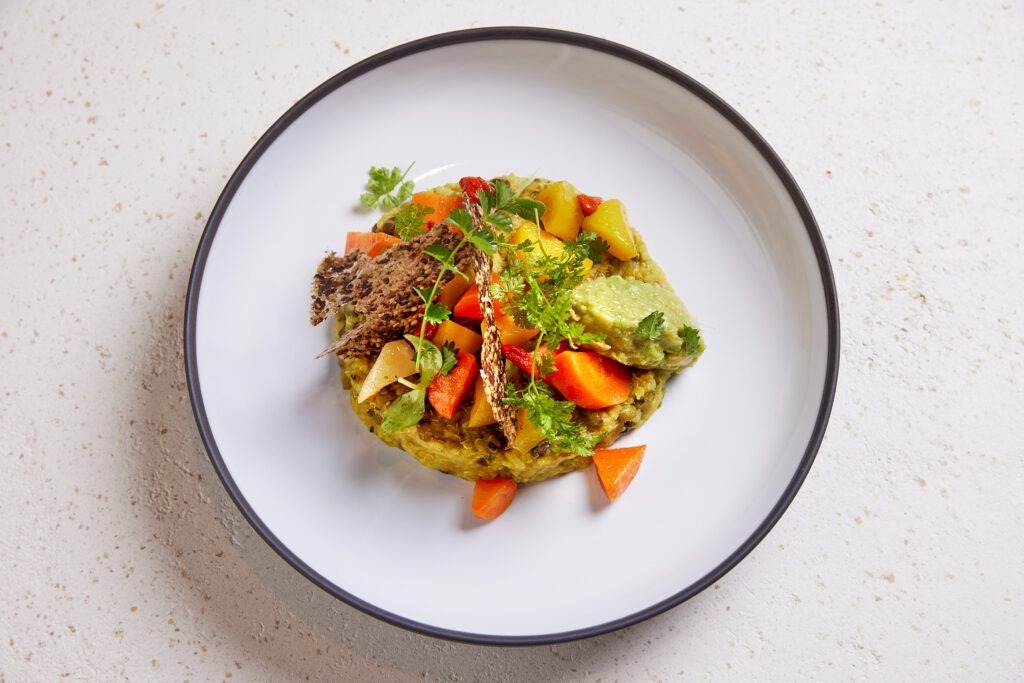Have you ever thought about how your diet not only nourishes your body, but also influences your inner balance?
From an Ayurvedic perspective, the wrong diet and poor eating behaviour not only cause us to suffer physically, but also to lose our emotional and psychological balance. We cannot concentrate well, are easily irritable or in a bad mood and simply do not enjoy being.
In a world where fast meals and unconscious eating often dominate, Ayurvedic cuisine invites us to
ayurvedic cuisine invites us to reconnect more deeply with ourselves and to lead a happy and fulfilling life.
Ayurvedic nutrition: a benefit for body, mind and soul
Ayurvedic teachings do not define nutrition purely as food intake, but as an art of self-care that harmonises body, mind and soul. This is because the millennia-old teaching is based on the principle of holism, according to which nutrition cannot be viewed in isolation. What, how and when we eat affects all levels of our being.
The findings are based on many years of medical research and have resulted in a complex nutritional theory that is not so easy for the layman to understand. Nevertheless, we would like to give you a brief and understandable summary of the most important basics.
What are the basics of Ayurvedic nutrition?
Basically, Ayurvedic nutrition is about taking into account the individual needs of each person. The dosha theory is used for this: Each of us is characterised by the three doshas – vata, pitta and kapha. These doshas determine our physical, mental and emotional state, also known as our constitution in Ayurveda. Depending on our constitution, certain foods and food combinations are best suited to bring us into balance and support our well-being. This is because the individual foods also have certain properties that affect our dosha balance.
These properties include the six flavours: sweet, sour, salty, hot, bitter and tart. These flavours have a direct effect on the doshas and can either balance or strengthen them.
What could a type-appropriate diet look like?
Depending on which dosha type you are, you should therefore make sure that your food contains certain flavours.
Ayurveda nutrition for Vata types
Warm foods and regular meals are particularly important for Vata types. Foods with a sweet, sour and salty flavour can balance excess Vata particularly well. This makes them feel grounded and calm again. Favourable foods are:
– Rice,
– root vegetables,
– sweet and sour fruits,
– nuts,
– warming spices such as ginger, cinnamon and cardamom.
Ayurvedic foods for Pitta types
Pitta types, on the other hand, should avoid hot, spicy and sour foods so as not to fuel their inner fire too much. Instead, concentrate on sweet, bitter and tart flavours, as in
– Wholemeal cereals,
– pulses,
– coconut,
– cucumber,
– bitter salads, herbs and vegetables
Nutrition for Kapha types
Kapha types, on the other hand, need a light, stimulating diet to support their often sluggish digestion and get them out of their comfort zone. Spicy, bitter and tart flavours are particularly beneficial for them. Well suited are
– Apples,
– pears,
– pulses,
– bitter vegetables
– and hot spices (pepper, chilli, garlic)
Even if it is difficult, you should stay away from extremely sweet foods.
Practical tips from the Ayurvedic diet
The Ayurvedic diet attaches great importance to fresh food. Ideally, food should be seasonal and as natural as possible. Fresh fruit, vegetables and herbs play a central role, as they not only bring nutrients but also life energy (prana) into our bodies.
Even more important than an original Ayurveda recipe is that you choose high-quality food that tastes good and is good for you. We also focus on this when preparing delicious dishes in our popular Ayurveda restaurant.

Cooked food is always preferable to raw food as it is easier to digest. For this reason, the Ayurvedic diet is also largely vegetarian. If you don’t want to give up meat and fish completely, make sure you only eat them in moderation and always in combination with spices that aid digestion, such as coriander and cumin.
And one last tip: consciously take time to savour your food! In our hectic world, we often tend to eat in a hurry and get distracted by reading or watching TV. Unfortunately, this is neither good for our digestion nor for our feeling of satiety. Instead, focus on the taste, texture and flavour and enjoy your food to the full!



